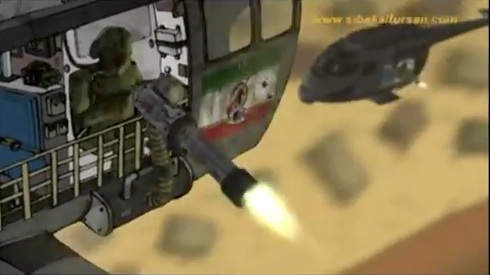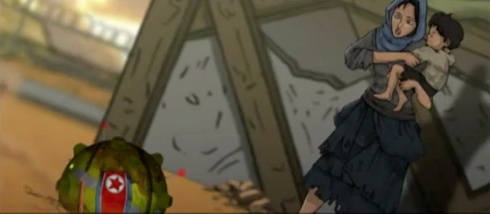|

As has been widely reported in recent days, former US Marine and former video game developer Amir Mirzaei Hekmati has been sentenced to death in Iran for alleged espionage and subversion. According to the New York Times, Hekmati was accused by Iran of, among other things, being involved in the development of video games intended to covertly change attitudes in the Middle East:
According to Iranian state television, a former United States marine who was convicted of spying on Iran and sentenced to death on Monday was also involved in a nefarious plot to brainwash the youth of the Middle East using an unlikely tool: video games.
In a video report broadcast last month, Amir Mirzaei Hekmati, the former marine of Iranian descent who was arrested during a visit to Tehran in August, allegedly confessed to a career in American intelligence that included a stint at a video game company in New York that was “a cover for the C.I.A.”
According to an English translation of the report published by The Tehran Times, an Iranian state-run newspaper, about one-third of the way through the report, Mr. Hekmati said he had worked for the Defense Advanced Research Projects Agency, or Darpa, after he left the Marine Corps in 2005. Then, according to the newspaper’s somewhat oddly worded translation, Mr. Hekmati said in Persian:
After Darpa, I was recruited by Kuma Games Company, a computer games company which received money from C.I.A. to design and make special films and computer games to change the public opinion’s mindset in the Middle East and distribute them among Middle East residents free of charge. The goal of Kuma Games was to convince the people of the world and Iraq that what the U.S. does in Iraq and other countries is good and acceptable.
He reportedly added: “The head of Kuma called me and said, ‘I have received your resume from Darpa, and we have a program in which you can help us.’ ” Kuma, Mr. Hekmati explained, “was also a cover for the C.I.A. and only the chief of company knows that you’re working with the agency.”*
The US has officially denied the Iranian charges.
The game publisher for whom Hekmati worked for a period, Kuma Games, certainly does publish Middle East themed games. Most of these are simply plug-in episodes for its Kuma/War series (108 of them and counting) in which players refight various semi-historical incidents, ranging from the death of Uday and Qusay Hussein in Iraq to Aghanistan to Muammar Qaddafi’s last stand in Libya. While the perspective is rather American, these games are essentially generic modern first-person shooters, mostly set in post-9/11 Iraq or Afghanistan (although you can also refight the UK’s Operation Barras rescue mission in Sierra Leone). A couple of episodes involve Iran, two based on the failed 1980 American hostage rescue mission in Iran and one (published in 2005) based on current nuclear tensions:
As a Special Forces soldier in this playable mission, you will infiltrate Iran’s nuclear facility at Natanz, located 150 miles south of Iran’s capital of Teheran. But breaching the security cordon around the hardened target won’t be easy. Your team’s mission: Infiltrate the base, secure evidence of illegal uranium enrichment, rescue your man on the inside, and destroy the centrifuges that promise to take Iran into the nuclear age. Never before has so much hung in the balance… millions of lives, and the very future of democracy could be at stake.
There’s really not much much of a political message in these games at all, beyond the notion that it’s generally not a good idea to get shot in a firefight.
Rather more interesting is Kuma Games’ newer episodic game Sibaq al-Fursan (Race of the Knights), the first episodes of which were published in 2010. This is sort of an apocalyptic Speed Racer-meets-Mad Max adventure, in which a group of heroes drives around an Arabia that was devastated by nuclear weapons (including the radioactive "Desert of Glass" and the "lost city of Dubai"), rescuing friends, battling the army of the False Caliph, and collecting gold-covered thorium beans (GTBs) to trade for various in-game upgrades. The game has been translated into Arabic (in Levant, Egyptian, and Gulf dialect), French, Urdu and Farsi—you’ll find the Arabic website here.

After a few introductory episodes, Iran pops up in this game quite a few times when the beautiful Princess Dima is kidnapped by the evil "False Caliph" to be dragged off to Isfahan (lovely city by the way, Princess!). The evil military forces also subtly sport a sort of hybrid Iranian flag-IRGC logo (see above), and drop North Korea-branded bombs on the brave Knights, their muscle cars, and poor radiation-afflicted refugees alike (see below). The bombs, incidentally, don’t seem that much more effective than the real North Korean ones, and fizzle as often as they explode.

In Episode 4, we’re explicitly told that Zulfiqar al-Harabi, the "False Caliph," is a former arms merchant who is supported by North Korea and the Iranian Revolutionary Guards. The dastardly villain seems to have kidnapped the princess in order to force her father, a scientist, to finish work on the ultimate weapon, which may soon be used against Damascus.

Is this a US-sponsored information operation intended to subtly promote the view among target audiences that Iran’s current nuclear program is a dangerous one? Or is it simply an episodic videogame that draws on current history, much as Hollywood movies or digital games have variously featured the Communist menace, evil South Africans, Latin American drug cartels, Middle Eastern terrorists, or even [youtube http://youtube.com/w/?v=0SDrqa-eTXU]? I have no idea. Certainly, however, one can imagine how already paranoid Iranian security officials might have been suspicious of an Iranian-American ex-Marine who worked under a DARPA contract, and also worked for the company that produced Sibaq al-Fursan, especially in a context of escalating US-Iranian geopolitical tensions. (Needless to add, however, Hekmati’s "confession" on Iranian TV is meaningless as evidence of anything at all. Forced confessions and show trials are a staple of Iran’s autocratic government, and some of the things he says—for example, about US policy, oil pricing, and OPEC—make no sense at all.)
At Slate yesterday, Will Oremus had a piece asking "Does the CIA really make video-game propaganda?" He notes that a great many games today address contemporary conflict themes, sometimes generating political controversy for doing so. Moreover, not all game playing societies have the same view of history, for obvious reasons. A case in point is the Vietnamese game company Emobi Games, which has just released 7554—a first person shooter videogame about the Viet Minh struggle against the French that commemorates the Vietnamese victory at the Battle of Dien Bien Phu on 7 May 1954 (it looks rather interesting too).

Getting back to the case of Iran, what might a covert, videogame-based information operation aimed at that country look like? Oremus asks that question to games researcher Ian Bogost, who suggests it might not look at all like Sibaq al-Fursan:
If U.S. intelligence agencies were making secret video games to foment unrest in Iran or elsewhere, they would likely be less violent and more focused on realistic decision-making scenarios. According to Ian Bogost, a Georgia Tech professor who co-founded a company that designs games as marketing tools for clients, the most persuasive games are those that model real-world systems and give users a chance to see the consequences of different courses of action. A game aimed at Iranians might seek to demonstrate the pitfalls of Islamism or the value of participation in a democratic opposition movement. (It would probably not be called, as one Kuma title is, [youtube http://youtube.com/w/?v=1foCZT4fW18].) One model might be People Power: The Game of Civil Resistance, a single-player, turn-based strategy game developed by the nonprofit International Center on Nonviolent Conflict in which the player builds alliances and chooses tactics to secure rights and freedoms for an oppressed populace.
I’m not so sure, however. People Power is not a terribly immersive game, and it is an open question whether that sort of politics-as-strategy -game approach would ever garner an adequate number of users. If I were trying to develop a game-with-a-message for casual users in a crowded digital game market, I would probably go with something a little more engaging.
Rex Brynen | 10/01/2012 at 5:47 pm | Tags: 7554, Amir Mirzaei Hekmati, CIA, Iran, videogames | Categories: simulation news | URL: http://wp.me/poTqF-NT
|
![]()
![]()